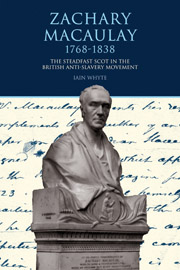Book contents
- Frontmatter
- Contents
- Foreword
- Acknowledgements
- Abbreviations
- List of Illustrations
- Chronology
- Introduction
- 1 From Inverary to the Sierra Leone River
- 2 Slave Traders and French Invaders
- 3 Captive in Love—to Selina Mills
- 4 The Trials of the Governor
- 5 Caught in a Multitude of Tasks
- 6 Clapham, Family and Friends
- 7 Attempting to Win France for Abolition
- 8 ‘Let Us Look it Up in Macaulay’—The Anti-Slavery Arms Manufacturer
- 9 Commerce and Conflict
- 10 Triumph and Tragedy on the Path to Glory
- 11 As Others Saw Him—As We Might Assess Him
- Bibliography
- Index
7 - Attempting to Win France for Abolition
- Frontmatter
- Contents
- Foreword
- Acknowledgements
- Abbreviations
- List of Illustrations
- Chronology
- Introduction
- 1 From Inverary to the Sierra Leone River
- 2 Slave Traders and French Invaders
- 3 Captive in Love—to Selina Mills
- 4 The Trials of the Governor
- 5 Caught in a Multitude of Tasks
- 6 Clapham, Family and Friends
- 7 Attempting to Win France for Abolition
- 8 ‘Let Us Look it Up in Macaulay’—The Anti-Slavery Arms Manufacturer
- 9 Commerce and Conflict
- 10 Triumph and Tragedy on the Path to Glory
- 11 As Others Saw Him—As We Might Assess Him
- Bibliography
- Index
Summary
The Wider Shores of Liberté
‘Many will envy you the honour of an interview with Madame de Staël. I presume you will be received into her chamber.’ Selina's innocent allusion was to nothing more intimate than a 'salon’, though it would have won knowing French smiles. Zachary almost certainly as innocently saw only virtue in the celebrated Baroness de Staël-Holstein's ‘own request’ for his company in May 1814, which he reported to Selina. The Baroness does not seem to have disillusioned him. The same letter from Paris carrying news of the de Staël invitation reported that the visit to her chamber would be followed by dinner with the French Colonial Minister, Baron de Malouet, ‘to talk over the interesting subject of the African Slave Trade’. Selina knew well that her husband would go anywhere and see anyone in the cause of abolition. She knew also that his attitude to France and to some unlikely allies within its people was complex in the two decades of his direct involvement with it, as it had been in his relationships with the French on the Sierra Leone coast 20 years previously.
His keenness to visit Paris as soon as possible after Napoleon's abdication on 14 April 1814 is significant. When Zachary Macaulay wrote from Sierra Leone to Thomas Babington in July 1794, he spoke of the ‘wickedness and impiety’ of Revolutionary France and of the ‘wild sanguinary measures of her mad, ferocious and diabolical rulers’.
- Type
- Chapter
- Information
- Zachary Macaulay 1768-1838The Steadfast Scot in the British Anti-Slavery Movement, pp. 148 - 168Publisher: Liverpool University PressPrint publication year: 2011

